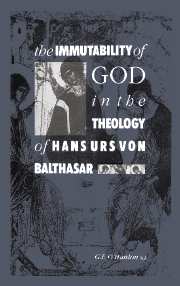Book contents
- Frontmatter
- Contents
- Acknowledgements
- Abbreviations
- Introduction
- 1 Christ and God's immutability
- 2 Creation and God's immutability
- 3 Time, eternity and God's immutability
- 4 Is the trinitarian God immutable?
- 5 Balthasar and other approaches
- 6 Final assessment
- Notes
- Bibliography
- Index of names
- Index of subjects
1 - Christ and God's immutability
Published online by Cambridge University Press: 05 October 2009
- Frontmatter
- Contents
- Acknowledgements
- Abbreviations
- Introduction
- 1 Christ and God's immutability
- 2 Creation and God's immutability
- 3 Time, eternity and God's immutability
- 4 Is the trinitarian God immutable?
- 5 Balthasar and other approaches
- 6 Final assessment
- Notes
- Bibliography
- Index of names
- Index of subjects
Summary
Balthasar's Christology and the question of God's immutability
Balthasar's theology of Christ is one of the contexts in which the question of the immutability of God arises. This is already clear in the 1969 edition of MP. In this, on the basis of the text in Philippians 2, 5–11, Balthasar affirms the reality of a kenotic ‘event’ in God, and asks how we are to maintain this reality in the face of the teaching on God's immutability and without falling away into theopaschism pure and simple. By the time of the new preface to the second French edition of this work in 1981 he goes further in actually relating his own discussion in MP to the contemporary theological debate on the whole issue of the immutability and impassability of God. The question is posed in MP with reference to the adequacy of the classical teaching in regard to Christ's incarnation and death, and indeed, by implication, in regard to every ‘kenosis’ of God in salvation history – meaning God's relation to Israel in the OT and, ultimately, to all humankind. These widening implications of MP are in fact developed thematically in TD and embrace further aspects of Balthasar's Christology. So, in particular, in the soteriological and eschatological dimensions of Christ's work for us, the question arises as to the nature of God: does he too not suffer, is he not affected by sin, can he be simply apathetic to the prospect of any final loss of his creatures to hell?
It is entirely understandable that Christology should be one of the contexts in which Balthasar's treatment of the divine immutability occurs.
- Type
- Chapter
- Information
- Publisher: Cambridge University PressPrint publication year: 1990



